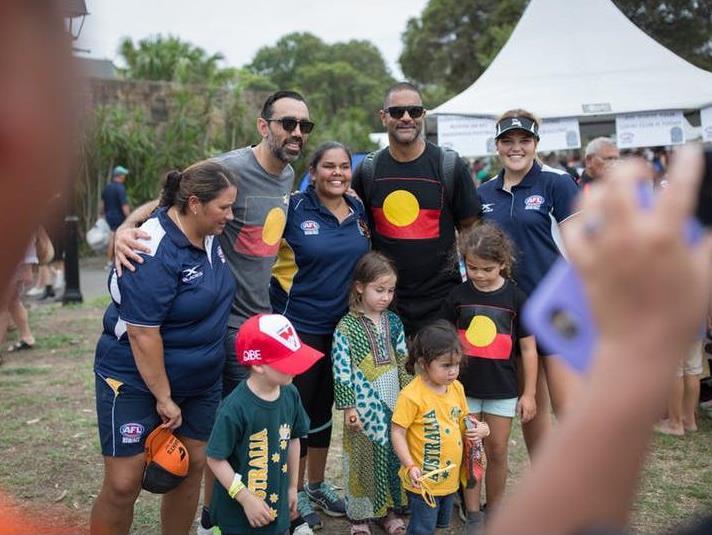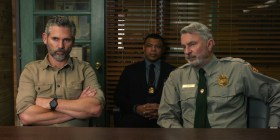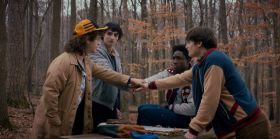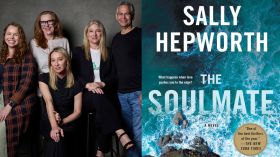This is a beautiful picture. Image courtesy of Melbourne International Film Festival.
The opening night of MIFF is the ceremonial climax for Melbourne’s distinctive approach to cinema. I’ve covered fifteen of them in succession. I saw Robert Connelly’s Balibo the night that the Timorese participants came on stage, along with Jose Ramos Horta, and I watched Paul Cox present his last film when he was visibly dying. But last night was even more special.
Everything came together. MIFF gave the opening night slot to The Australian Dream, which tells the story of the persecution of Aboriginal footballer Adam Goodes until he quit the game and went home to Country to renew himself. He was there with his family, quietly and without celebrity strutting.
This film covers some of the same territory as The Final Quarter, the incandescent archival film from Ian Darling which takes us deep into the relentless persecution of one man mocked in waves of hatred, for pleasure, week after week. It is a picture of homegrown suburban-crafted fascism.
But this film works with the older tradition of testimony and oratory, a mode which connects us somehow with the ancient unbroken traditions of Aboriginal Australia. Broadcast journalist Stan Grant has the guiding role, while athletes Nova Peris, Gilbert McAdam and Adam Goodes himself tell a common history of restless families in trauma after the Stolen Generations. And it is actually the longer story which takes us into the deeper experience of utter racist humiliation. It is a story of human psychology, of the victims blamed with such blind and destructive faith, who learn at last to defend themselves with a knowledge of their Aboriginal identity.
I’ve never heard a MIFF audience clap and cheer during a film before. Afterwards, with our usual reticence, we rose to our feet in a messy wave which was simply heartfelt. It’s the opposite of a footy crowd which screams and bellows over games of let’s pretend; here we were on our feet because this is all very real.
We are living in dismaying times. We feel baffled and robbed, watching a Prime Minister who waddles around like a country headmaster with a cruel, condescending heart. We feel the way Australia struggles to become a place where humanity can live at its best, united by generosity, able to forgive, speaking truth kindly to each other, inspired by crossing cultural boundaries. We are seeing this trashed.
The fact that the location for this story is the AFL, our great central tradition, gives it huge energy. Here Australians feel liberated and we can see just what we really dream. We come together into a unified whole, which is also a mob, and we are presented with our unreflective ignorance about scapegoating and a rhythmic frenzy of hate. Its promoters are honoured and given space. Andrew Bolt, Sam Newman and Eddie McGuire are all here, mostly interviewed, glowing with righteousness and condemning themselves.
This is a global film. Madman has spent years putting it together and is immensely proud of it, according to CEO Paul Wiegard. Madman worked with a British consortium around John Batsas and Passion Pictures, a company which specialises in films of human biographical drama around sport. The director, Daniel Gordon, knows nothing about AFL and barely more about Australia.
He did a very good job, not flashy as he acknowledged at the party, but simply effective, using an outsider’s fresh point of view and an ear for the telling story. I won’t forget the modest reconstructions of Adam Goodes back in Country, and that image of digging his bare feet in the sand, seen later from the air as he lies alone and immobile in some deep communion.
This picture is not going to be easy to hide. I heard two young men in suits in our local coffee shop talking about the Channel Ten version of The Final Quarter. They were blown away by it. The Australian Dream is more reflective, showcases power, and has such generosity. With international finance it has a UK deal with both theatrical distribution and television broadcast, with the likelihood of North American sales. So we will hear what the world thinks of our collective behaviour.
If the critics in the rest of the English-speaking world are honest, they will admit that racism is endemic and pack behaviour is an endless blight on civilisation, but our experience is particularly clear. We have to acknowledge the truth and reconcile with our past to move forward to a place full of promise.
At least for a night, at the opening of the 2019 Melbourne International Film Festival, we shared the gift of honest, gut-wrenching stories, and saw them bound together in a vision by our heroes. How often, in our particular politics, do we see people speak with all the tools of language to inspire us with the truth?
This speech is in the film. It is really something.





